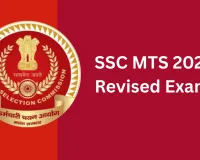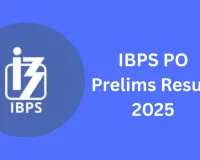UPSC Chairman Explains Answer Sheet Policy: "Students Know Their Marked Answers, Answer Keys Should Suffice"
Digital Desk
.jpg)
UPSC Chairman Ajay Kumar addressed civil service aspirants in the commission's first-ever virtual town hall, defending the practice of not revealing individual answer sheets while emphasizing that answer keys provide sufficient information for candidates to evaluate their performance.
Chairman's Defense of Current Policy
During the historic town hall session streamed live on DD News' YouTube channel on October 1, 2025, Chairman Ajay Kumar responded to persistent questions about why UPSC doesn't show students their answer sheets or OMR sheets. His explanation centered on the premise that "every student knows what answers they gave" and that releasing answer keys should be adequate for performance evaluation.
Kumar clarified that while UPSC releases answer keys, students can still request copies of their OMR sheets if needed. "If anyone needs a copy, they can request a copy of their OMR sheet from the UPSC. It is provided," he stated during the session. This facility already exists but remains underutilized by many aspirants who are unaware of this option.
The Answer Key Controversy
The timing and transparency of answer key releases has become a contentious issue among UPSC aspirants. Currently, UPSC follows a practice of releasing answer keys only after the entire examination process concludes - nearly a year after the preliminary examination. This policy has drawn significant criticism from candidates who argue that delayed disclosure prevents meaningful review of their performance.
The 2024 precedent was particularly problematic: UPSC released the 2024 Prelims answer key just four days before the 2025 Prelims exam, leaving candidates with minimal time to analyze their mistakes. This practice has been described as "performative" rather than genuinely helpful for preparation purposes.
Legal Challenges and Transparency Demands
The delayed answer key policy has faced substantial legal scrutiny. Twenty-eight UPSC aspirants filed a writ petition in the Supreme Court challenging the commission's "arbitrary, exclusionary and non-transparent" practice. The petition argued that delayed disclosure denies candidates meaningful opportunity to challenge demonstrable errors in answer keys, potentially resulting in wrongful exclusion from the Mains stage.
The petition highlighted past instances where errors in official answer keys, disclosed nearly a year later, materially altered cut-offs. In CSE 2024, deletion and mis-keying of questions allegedly caused a variation of over 6% in qualifying marks, affecting thousands of candidates.
UPSC's Institutional Response
Chairman Kumar explained that UPSC's current system involves multiple layers of review for questions and answer keys. "Officers don't make questions. Subject experts create them. Other experts check the answers," he stated, emphasizing the rigorous verification process. When questions are found to have multiple interpretations after examination by different panels, they are dropped from evaluation.
The commission currently operates a portal system where candidates can submit objections to answer keys, which are then reviewed by top academic experts who remain anonymous. However, this review process occurs well after the preliminary examination, limiting its practical utility for immediate performance assessment.
Technological Measures Against Cheating
Addressing the Pooja Khedkar controversy, Kumar emphasized UPSC's zero-tolerance policy toward cheating. The commission has implemented several technological safeguards including Aadhaar integration to prevent impersonation and face authorization at examination center entries. Future plans include verifying candidate certificates through DigiLocker to maintain document authenticity.
"We do not want children to start their careers to serve the country through cheating," Kumar stated, warning that any form of cheating - whether in examinations or document falsification - results in criminal FIR filing and minimum three-year suspension from UPSC examinations.
Broader Implications for Civil Services Transparency
The town hall marked the beginning of UPSC's centenary year celebrations, running from October 1, 2025, to October 1, 2026. Established in 1926, UPSC has conducted civil services examinations for nearly 100 years, maintaining its position as India's premier recruitment body for administrative services.
Kumar's statements reflect the commission's stance on balancing transparency with administrative efficiency. While acknowledging the matter of immediate answer key disclosure is currently sub-judice in the Supreme Court, the chairman maintained that existing provisions adequately serve candidate needs.
The debate over answer sheet access and timely key releases continues to highlight tensions between UPSC's traditional approach and aspirants' demands for greater transparency. With over 10 lakh candidates appearing annually for preliminary examinations, even minor procedural changes could significantly impact the civil services selection process.
The commission's position remains firm: answer keys combined with the option to request OMR sheets provide sufficient transparency, while protecting the integrity of the evaluation process that has served India's administrative machinery for nearly a century.

.jpg)
.jpg)


.jpg)

.jpg)
.jpg)

.jpg)
